Information Systems and Communication: Qantas Airlines Case Study
VerifiedAdded on 2020/03/04
|15
|3372
|34
Case Study
AI Summary
This case study analyzes Qantas Airlines' challenges in managing its social media presence and the resulting communication crisis. It emphasizes the importance of strategic information systems, effective communication skills, and customer involvement in mitigating such crises. The report is divided into four parts, starting with an overview of analytical information systems and their strategic importance, followed by a discussion on communication skills and their role in both internal and external communication. It then proposes an action plan for Qantas, including strategic planning and the integration of strategic information systems planning (SISP), and finally offers recommendations for improving Qantas's response to future crises. The study highlights the need for organizations to adapt to the digital evolution of social media, develop robust communication strategies, and prioritize customer needs to build a strong brand reputation and maintain customer loyalty. The case underscores the significance of timely information dissemination, knowledge sharing, and the strategic use of social media channels like Twitter to manage customer relationships and respond effectively to negative feedback.
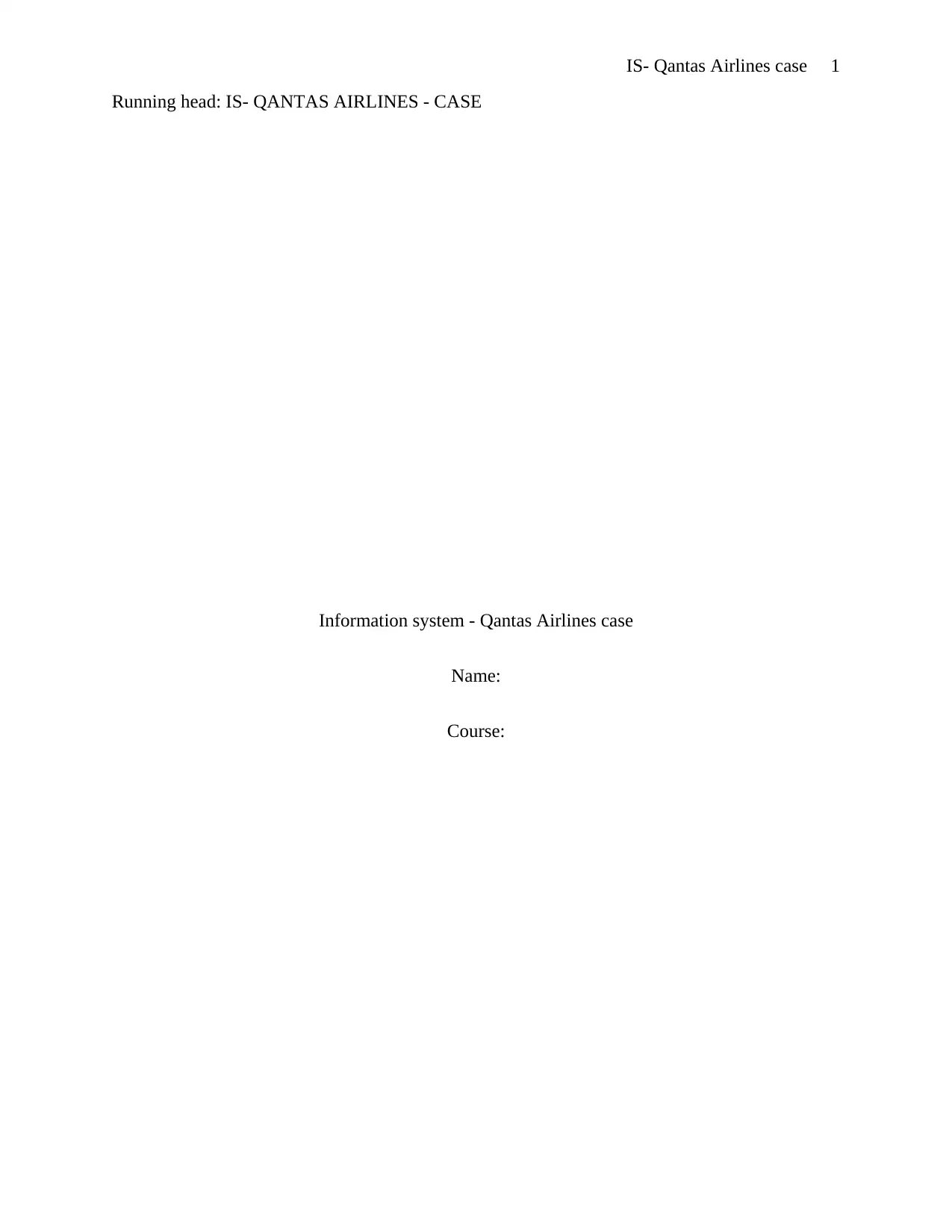
1IS- Qantas Airlines case
Running head: IS- QANTAS AIRLINES - CASE
Information system - Qantas Airlines case
Name:
Course:
Running head: IS- QANTAS AIRLINES - CASE
Information system - Qantas Airlines case
Name:
Course:
Paraphrase This Document
Need a fresh take? Get an instant paraphrase of this document with our AI Paraphraser
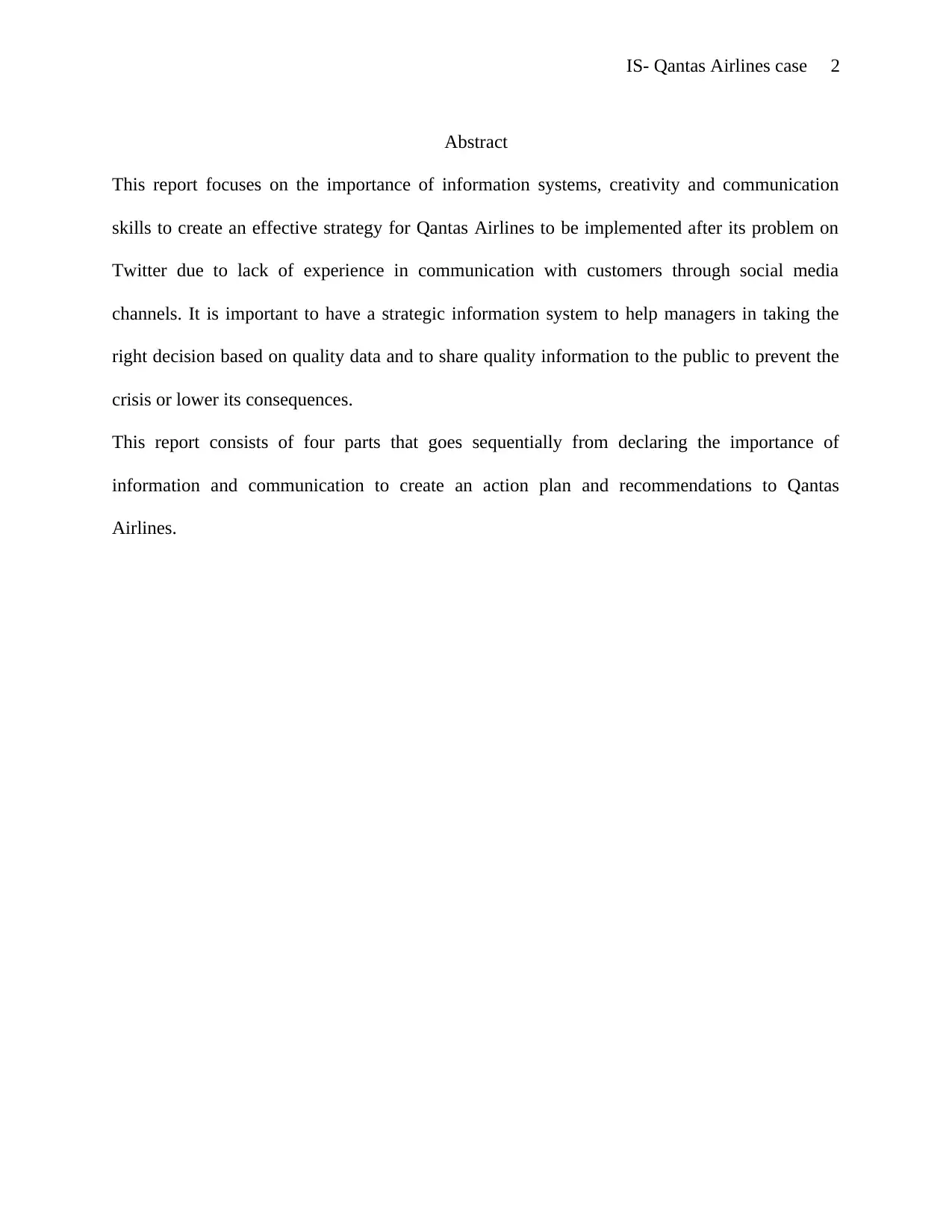
2IS- Qantas Airlines case
Abstract
This report focuses on the importance of information systems, creativity and communication
skills to create an effective strategy for Qantas Airlines to be implemented after its problem on
Twitter due to lack of experience in communication with customers through social media
channels. It is important to have a strategic information system to help managers in taking the
right decision based on quality data and to share quality information to the public to prevent the
crisis or lower its consequences.
This report consists of four parts that goes sequentially from declaring the importance of
information and communication to create an action plan and recommendations to Qantas
Airlines.
Abstract
This report focuses on the importance of information systems, creativity and communication
skills to create an effective strategy for Qantas Airlines to be implemented after its problem on
Twitter due to lack of experience in communication with customers through social media
channels. It is important to have a strategic information system to help managers in taking the
right decision based on quality data and to share quality information to the public to prevent the
crisis or lower its consequences.
This report consists of four parts that goes sequentially from declaring the importance of
information and communication to create an action plan and recommendations to Qantas
Airlines.
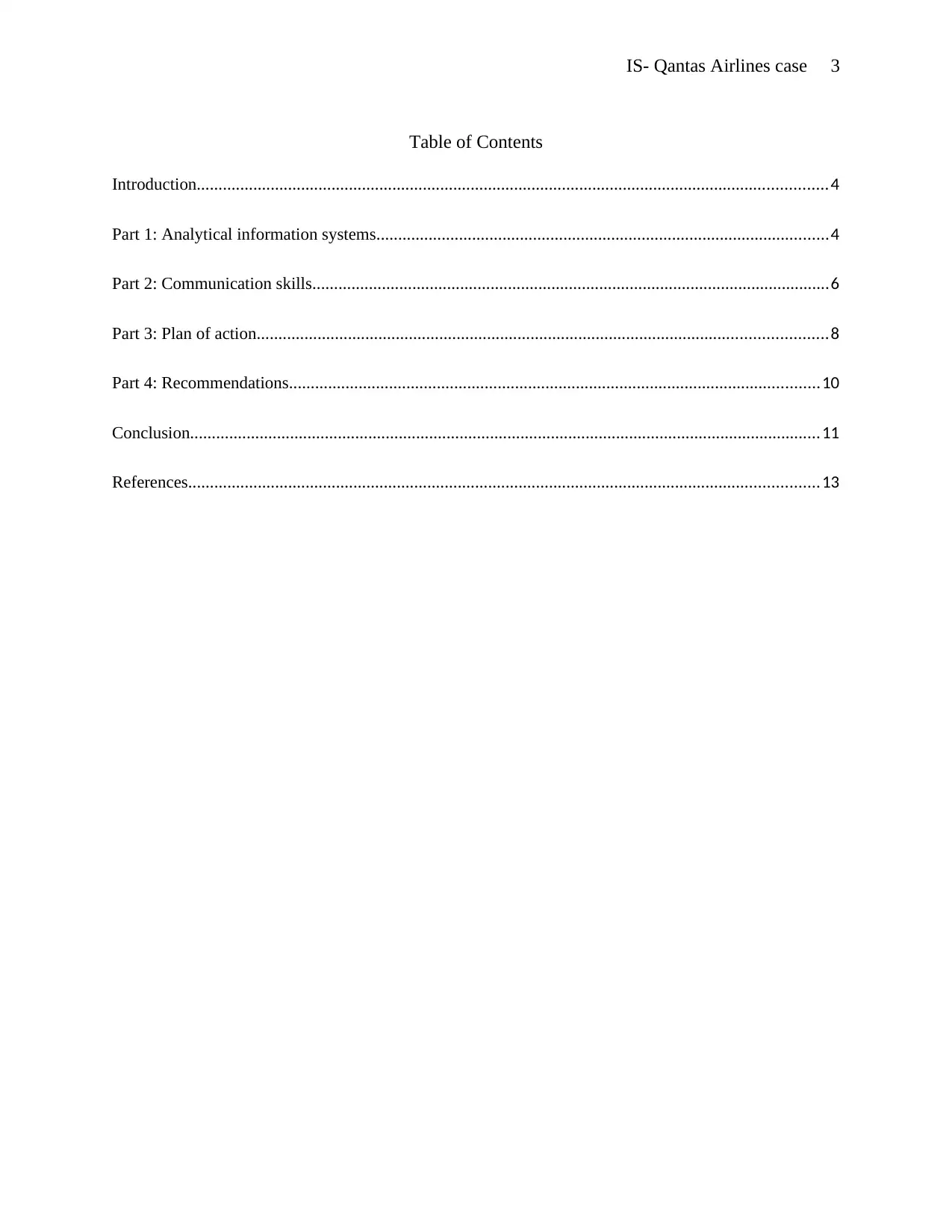
3IS- Qantas Airlines case
Table of Contents
Introduction.................................................................................................................................................4
Part 1: Analytical information systems........................................................................................................4
Part 2: Communication skills.......................................................................................................................6
Part 3: Plan of action...................................................................................................................................8
Part 4: Recommendations..........................................................................................................................10
Conclusion.................................................................................................................................................11
References.................................................................................................................................................13
Table of Contents
Introduction.................................................................................................................................................4
Part 1: Analytical information systems........................................................................................................4
Part 2: Communication skills.......................................................................................................................6
Part 3: Plan of action...................................................................................................................................8
Part 4: Recommendations..........................................................................................................................10
Conclusion.................................................................................................................................................11
References.................................................................................................................................................13
⊘ This is a preview!⊘
Do you want full access?
Subscribe today to unlock all pages.

Trusted by 1+ million students worldwide
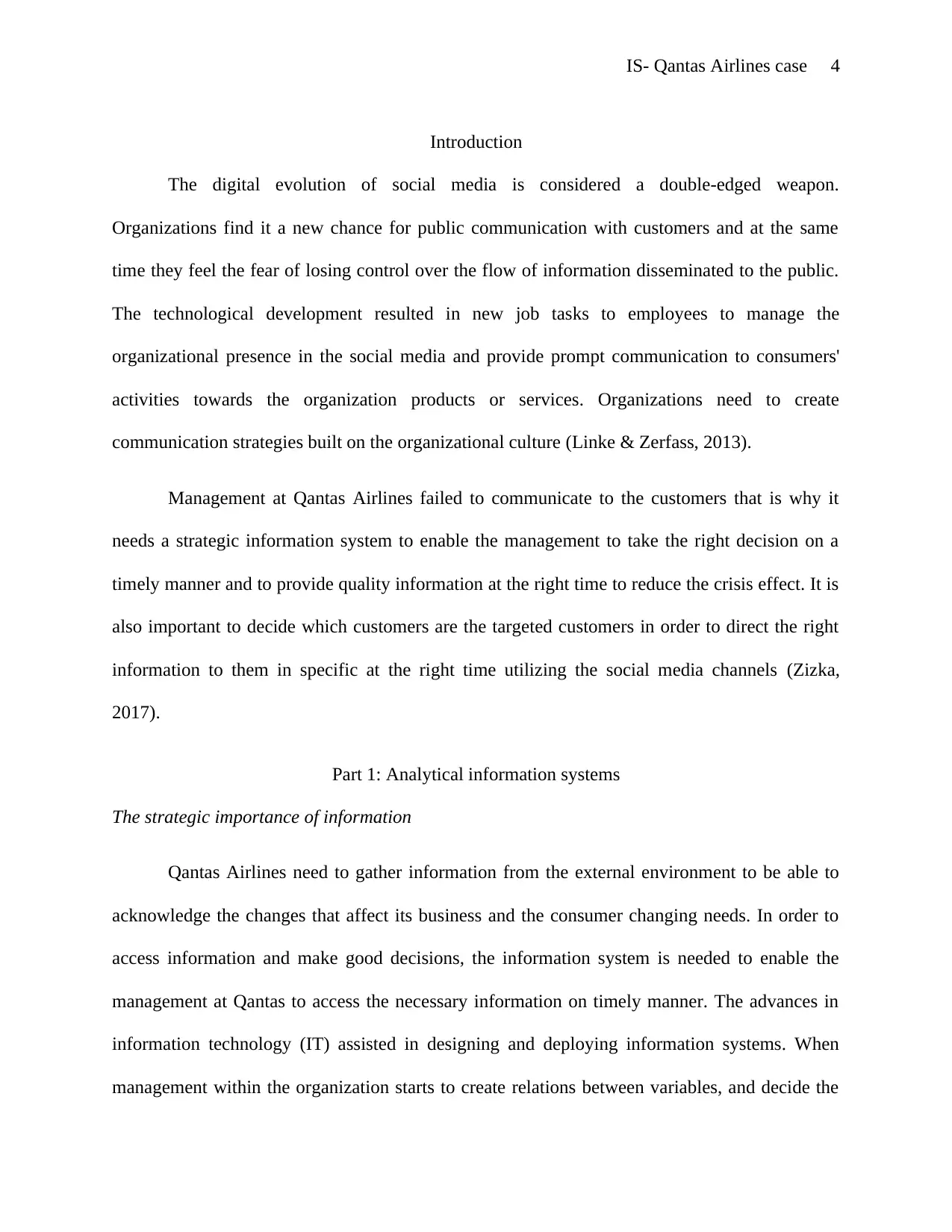
4IS- Qantas Airlines case
Introduction
The digital evolution of social media is considered a double-edged weapon.
Organizations find it a new chance for public communication with customers and at the same
time they feel the fear of losing control over the flow of information disseminated to the public.
The technological development resulted in new job tasks to employees to manage the
organizational presence in the social media and provide prompt communication to consumers'
activities towards the organization products or services. Organizations need to create
communication strategies built on the organizational culture (Linke & Zerfass, 2013).
Management at Qantas Airlines failed to communicate to the customers that is why it
needs a strategic information system to enable the management to take the right decision on a
timely manner and to provide quality information at the right time to reduce the crisis effect. It is
also important to decide which customers are the targeted customers in order to direct the right
information to them in specific at the right time utilizing the social media channels (Zizka,
2017).
Part 1: Analytical information systems
The strategic importance of information
Qantas Airlines need to gather information from the external environment to be able to
acknowledge the changes that affect its business and the consumer changing needs. In order to
access information and make good decisions, the information system is needed to enable the
management at Qantas to access the necessary information on timely manner. The advances in
information technology (IT) assisted in designing and deploying information systems. When
management within the organization starts to create relations between variables, and decide the
Introduction
The digital evolution of social media is considered a double-edged weapon.
Organizations find it a new chance for public communication with customers and at the same
time they feel the fear of losing control over the flow of information disseminated to the public.
The technological development resulted in new job tasks to employees to manage the
organizational presence in the social media and provide prompt communication to consumers'
activities towards the organization products or services. Organizations need to create
communication strategies built on the organizational culture (Linke & Zerfass, 2013).
Management at Qantas Airlines failed to communicate to the customers that is why it
needs a strategic information system to enable the management to take the right decision on a
timely manner and to provide quality information at the right time to reduce the crisis effect. It is
also important to decide which customers are the targeted customers in order to direct the right
information to them in specific at the right time utilizing the social media channels (Zizka,
2017).
Part 1: Analytical information systems
The strategic importance of information
Qantas Airlines need to gather information from the external environment to be able to
acknowledge the changes that affect its business and the consumer changing needs. In order to
access information and make good decisions, the information system is needed to enable the
management at Qantas to access the necessary information on timely manner. The advances in
information technology (IT) assisted in designing and deploying information systems. When
management within the organization starts to create relations between variables, and decide the
Paraphrase This Document
Need a fresh take? Get an instant paraphrase of this document with our AI Paraphraser
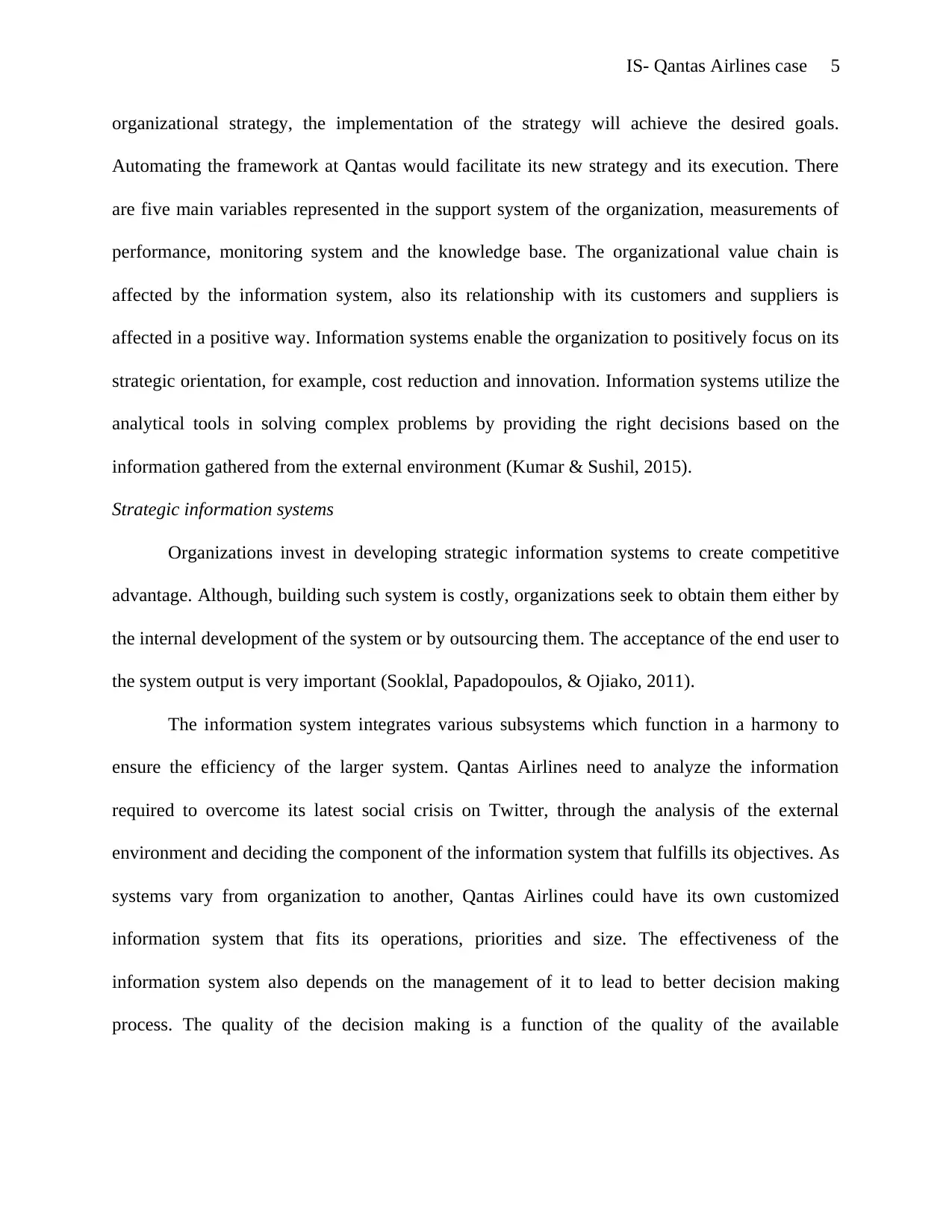
5IS- Qantas Airlines case
organizational strategy, the implementation of the strategy will achieve the desired goals.
Automating the framework at Qantas would facilitate its new strategy and its execution. There
are five main variables represented in the support system of the organization, measurements of
performance, monitoring system and the knowledge base. The organizational value chain is
affected by the information system, also its relationship with its customers and suppliers is
affected in a positive way. Information systems enable the organization to positively focus on its
strategic orientation, for example, cost reduction and innovation. Information systems utilize the
analytical tools in solving complex problems by providing the right decisions based on the
information gathered from the external environment (Kumar & Sushil, 2015).
Strategic information systems
Organizations invest in developing strategic information systems to create competitive
advantage. Although, building such system is costly, organizations seek to obtain them either by
the internal development of the system or by outsourcing them. The acceptance of the end user to
the system output is very important (Sooklal, Papadopoulos, & Ojiako, 2011).
The information system integrates various subsystems which function in a harmony to
ensure the efficiency of the larger system. Qantas Airlines need to analyze the information
required to overcome its latest social crisis on Twitter, through the analysis of the external
environment and deciding the component of the information system that fulfills its objectives. As
systems vary from organization to another, Qantas Airlines could have its own customized
information system that fits its operations, priorities and size. The effectiveness of the
information system also depends on the management of it to lead to better decision making
process. The quality of the decision making is a function of the quality of the available
organizational strategy, the implementation of the strategy will achieve the desired goals.
Automating the framework at Qantas would facilitate its new strategy and its execution. There
are five main variables represented in the support system of the organization, measurements of
performance, monitoring system and the knowledge base. The organizational value chain is
affected by the information system, also its relationship with its customers and suppliers is
affected in a positive way. Information systems enable the organization to positively focus on its
strategic orientation, for example, cost reduction and innovation. Information systems utilize the
analytical tools in solving complex problems by providing the right decisions based on the
information gathered from the external environment (Kumar & Sushil, 2015).
Strategic information systems
Organizations invest in developing strategic information systems to create competitive
advantage. Although, building such system is costly, organizations seek to obtain them either by
the internal development of the system or by outsourcing them. The acceptance of the end user to
the system output is very important (Sooklal, Papadopoulos, & Ojiako, 2011).
The information system integrates various subsystems which function in a harmony to
ensure the efficiency of the larger system. Qantas Airlines need to analyze the information
required to overcome its latest social crisis on Twitter, through the analysis of the external
environment and deciding the component of the information system that fulfills its objectives. As
systems vary from organization to another, Qantas Airlines could have its own customized
information system that fits its operations, priorities and size. The effectiveness of the
information system also depends on the management of it to lead to better decision making
process. The quality of the decision making is a function of the quality of the available
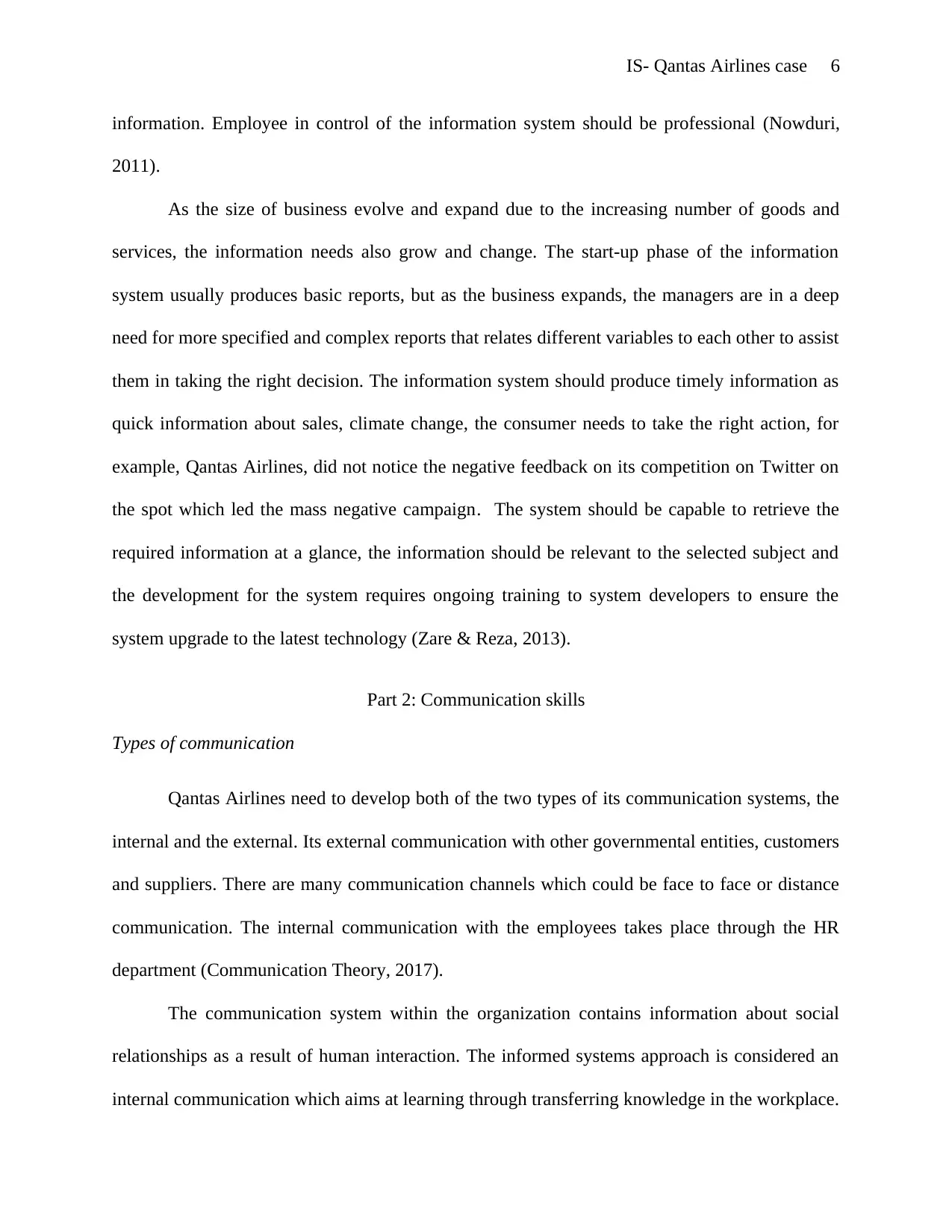
6IS- Qantas Airlines case
information. Employee in control of the information system should be professional (Nowduri,
2011).
As the size of business evolve and expand due to the increasing number of goods and
services, the information needs also grow and change. The start-up phase of the information
system usually produces basic reports, but as the business expands, the managers are in a deep
need for more specified and complex reports that relates different variables to each other to assist
them in taking the right decision. The information system should produce timely information as
quick information about sales, climate change, the consumer needs to take the right action, for
example, Qantas Airlines, did not notice the negative feedback on its competition on Twitter on
the spot which led the mass negative campaign. The system should be capable to retrieve the
required information at a glance, the information should be relevant to the selected subject and
the development for the system requires ongoing training to system developers to ensure the
system upgrade to the latest technology (Zare & Reza, 2013).
Part 2: Communication skills
Types of communication
Qantas Airlines need to develop both of the two types of its communication systems, the
internal and the external. Its external communication with other governmental entities, customers
and suppliers. There are many communication channels which could be face to face or distance
communication. The internal communication with the employees takes place through the HR
department (Communication Theory, 2017).
The communication system within the organization contains information about social
relationships as a result of human interaction. The informed systems approach is considered an
internal communication which aims at learning through transferring knowledge in the workplace.
information. Employee in control of the information system should be professional (Nowduri,
2011).
As the size of business evolve and expand due to the increasing number of goods and
services, the information needs also grow and change. The start-up phase of the information
system usually produces basic reports, but as the business expands, the managers are in a deep
need for more specified and complex reports that relates different variables to each other to assist
them in taking the right decision. The information system should produce timely information as
quick information about sales, climate change, the consumer needs to take the right action, for
example, Qantas Airlines, did not notice the negative feedback on its competition on Twitter on
the spot which led the mass negative campaign. The system should be capable to retrieve the
required information at a glance, the information should be relevant to the selected subject and
the development for the system requires ongoing training to system developers to ensure the
system upgrade to the latest technology (Zare & Reza, 2013).
Part 2: Communication skills
Types of communication
Qantas Airlines need to develop both of the two types of its communication systems, the
internal and the external. Its external communication with other governmental entities, customers
and suppliers. There are many communication channels which could be face to face or distance
communication. The internal communication with the employees takes place through the HR
department (Communication Theory, 2017).
The communication system within the organization contains information about social
relationships as a result of human interaction. The informed systems approach is considered an
internal communication which aims at learning through transferring knowledge in the workplace.
⊘ This is a preview!⊘
Do you want full access?
Subscribe today to unlock all pages.

Trusted by 1+ million students worldwide
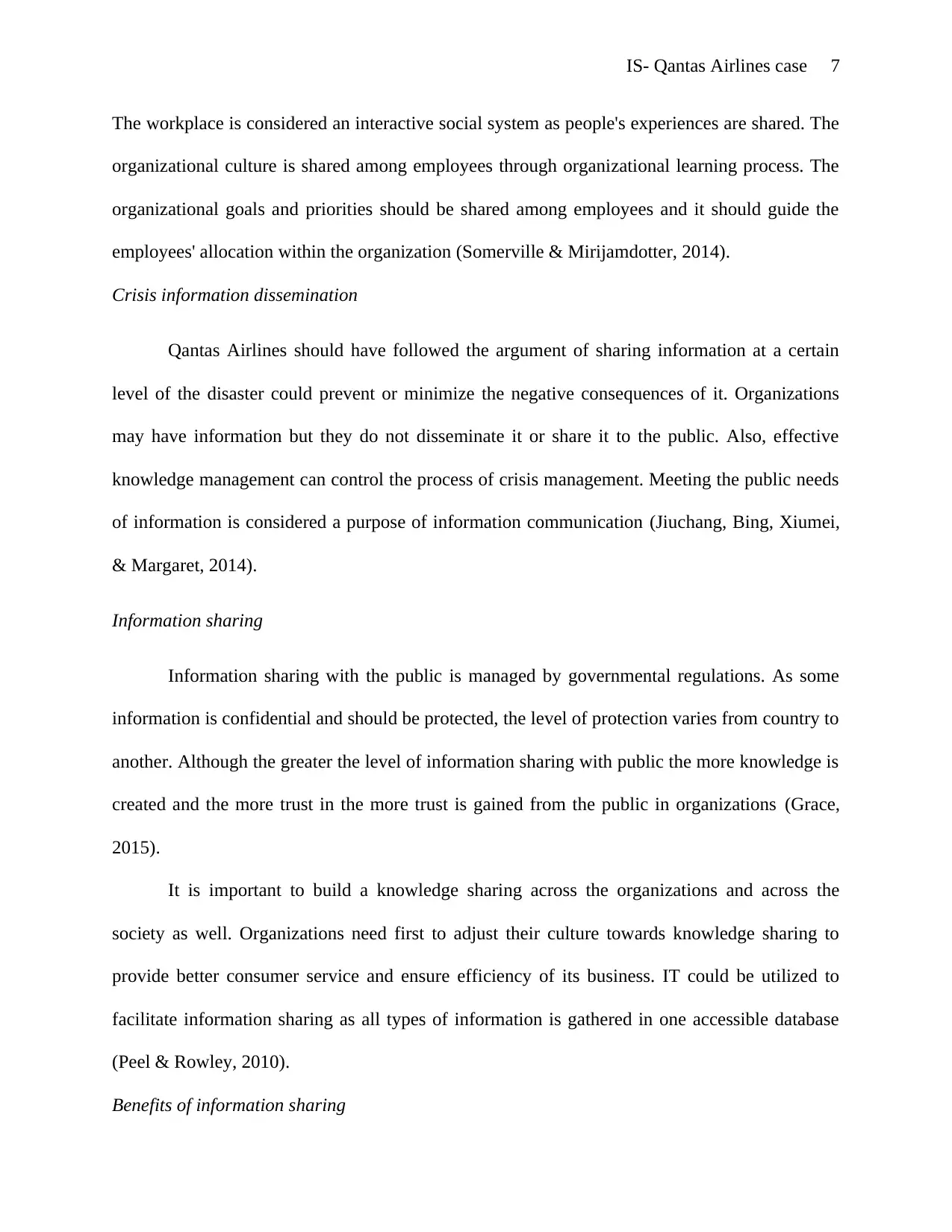
7IS- Qantas Airlines case
The workplace is considered an interactive social system as people's experiences are shared. The
organizational culture is shared among employees through organizational learning process. The
organizational goals and priorities should be shared among employees and it should guide the
employees' allocation within the organization (Somerville & Mirijamdotter, 2014).
Crisis information dissemination
Qantas Airlines should have followed the argument of sharing information at a certain
level of the disaster could prevent or minimize the negative consequences of it. Organizations
may have information but they do not disseminate it or share it to the public. Also, effective
knowledge management can control the process of crisis management. Meeting the public needs
of information is considered a purpose of information communication (Jiuchang, Bing, Xiumei,
& Margaret, 2014).
Information sharing
Information sharing with the public is managed by governmental regulations. As some
information is confidential and should be protected, the level of protection varies from country to
another. Although the greater the level of information sharing with public the more knowledge is
created and the more trust in the more trust is gained from the public in organizations (Grace,
2015).
It is important to build a knowledge sharing across the organizations and across the
society as well. Organizations need first to adjust their culture towards knowledge sharing to
provide better consumer service and ensure efficiency of its business. IT could be utilized to
facilitate information sharing as all types of information is gathered in one accessible database
(Peel & Rowley, 2010).
Benefits of information sharing
The workplace is considered an interactive social system as people's experiences are shared. The
organizational culture is shared among employees through organizational learning process. The
organizational goals and priorities should be shared among employees and it should guide the
employees' allocation within the organization (Somerville & Mirijamdotter, 2014).
Crisis information dissemination
Qantas Airlines should have followed the argument of sharing information at a certain
level of the disaster could prevent or minimize the negative consequences of it. Organizations
may have information but they do not disseminate it or share it to the public. Also, effective
knowledge management can control the process of crisis management. Meeting the public needs
of information is considered a purpose of information communication (Jiuchang, Bing, Xiumei,
& Margaret, 2014).
Information sharing
Information sharing with the public is managed by governmental regulations. As some
information is confidential and should be protected, the level of protection varies from country to
another. Although the greater the level of information sharing with public the more knowledge is
created and the more trust in the more trust is gained from the public in organizations (Grace,
2015).
It is important to build a knowledge sharing across the organizations and across the
society as well. Organizations need first to adjust their culture towards knowledge sharing to
provide better consumer service and ensure efficiency of its business. IT could be utilized to
facilitate information sharing as all types of information is gathered in one accessible database
(Peel & Rowley, 2010).
Benefits of information sharing
Paraphrase This Document
Need a fresh take? Get an instant paraphrase of this document with our AI Paraphraser
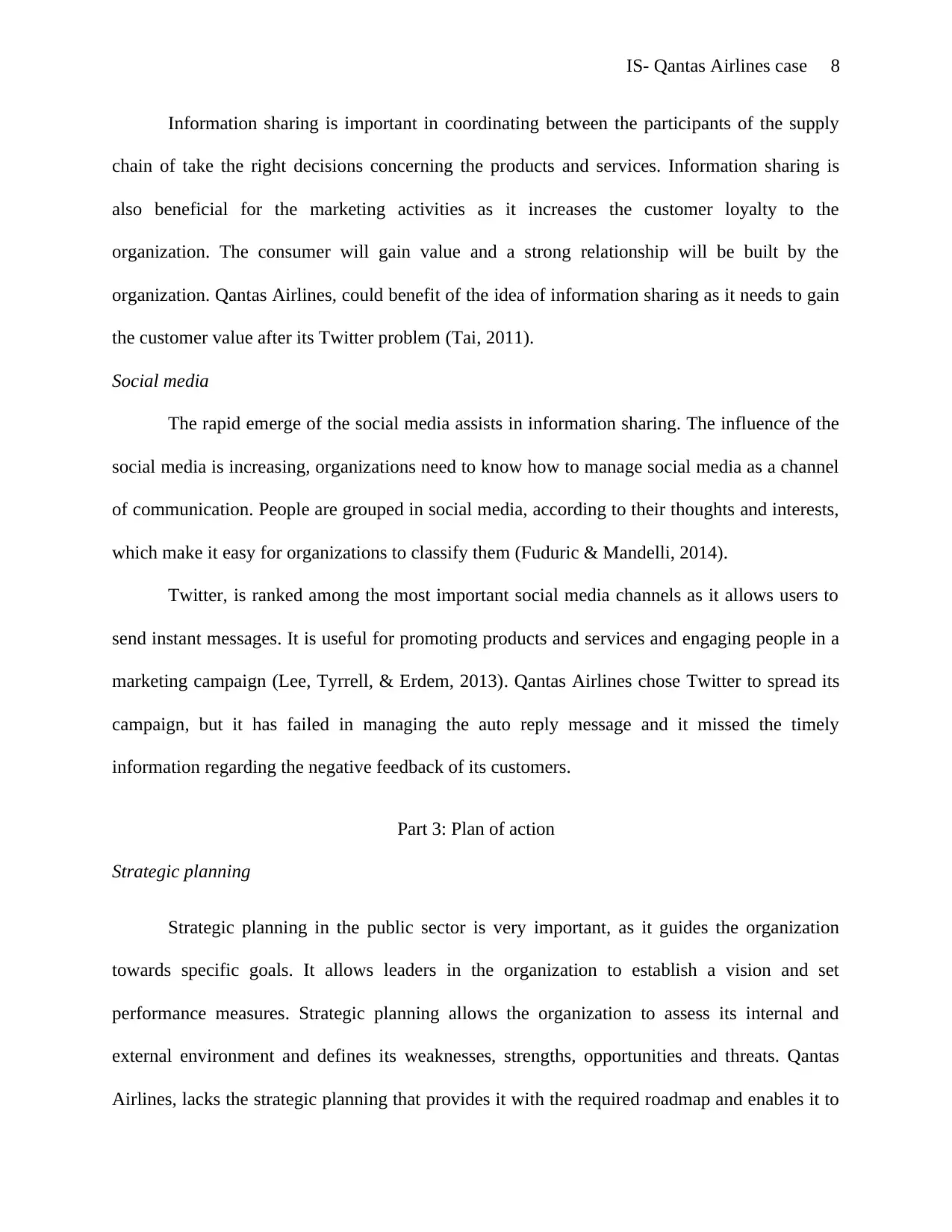
8IS- Qantas Airlines case
Information sharing is important in coordinating between the participants of the supply
chain of take the right decisions concerning the products and services. Information sharing is
also beneficial for the marketing activities as it increases the customer loyalty to the
organization. The consumer will gain value and a strong relationship will be built by the
organization. Qantas Airlines, could benefit of the idea of information sharing as it needs to gain
the customer value after its Twitter problem (Tai, 2011).
Social media
The rapid emerge of the social media assists in information sharing. The influence of the
social media is increasing, organizations need to know how to manage social media as a channel
of communication. People are grouped in social media, according to their thoughts and interests,
which make it easy for organizations to classify them (Fuduric & Mandelli, 2014).
Twitter, is ranked among the most important social media channels as it allows users to
send instant messages. It is useful for promoting products and services and engaging people in a
marketing campaign (Lee, Tyrrell, & Erdem, 2013). Qantas Airlines chose Twitter to spread its
campaign, but it has failed in managing the auto reply message and it missed the timely
information regarding the negative feedback of its customers.
Part 3: Plan of action
Strategic planning
Strategic planning in the public sector is very important, as it guides the organization
towards specific goals. It allows leaders in the organization to establish a vision and set
performance measures. Strategic planning allows the organization to assess its internal and
external environment and defines its weaknesses, strengths, opportunities and threats. Qantas
Airlines, lacks the strategic planning that provides it with the required roadmap and enables it to
Information sharing is important in coordinating between the participants of the supply
chain of take the right decisions concerning the products and services. Information sharing is
also beneficial for the marketing activities as it increases the customer loyalty to the
organization. The consumer will gain value and a strong relationship will be built by the
organization. Qantas Airlines, could benefit of the idea of information sharing as it needs to gain
the customer value after its Twitter problem (Tai, 2011).
Social media
The rapid emerge of the social media assists in information sharing. The influence of the
social media is increasing, organizations need to know how to manage social media as a channel
of communication. People are grouped in social media, according to their thoughts and interests,
which make it easy for organizations to classify them (Fuduric & Mandelli, 2014).
Twitter, is ranked among the most important social media channels as it allows users to
send instant messages. It is useful for promoting products and services and engaging people in a
marketing campaign (Lee, Tyrrell, & Erdem, 2013). Qantas Airlines chose Twitter to spread its
campaign, but it has failed in managing the auto reply message and it missed the timely
information regarding the negative feedback of its customers.
Part 3: Plan of action
Strategic planning
Strategic planning in the public sector is very important, as it guides the organization
towards specific goals. It allows leaders in the organization to establish a vision and set
performance measures. Strategic planning allows the organization to assess its internal and
external environment and defines its weaknesses, strengths, opportunities and threats. Qantas
Airlines, lacks the strategic planning that provides it with the required roadmap and enables it to
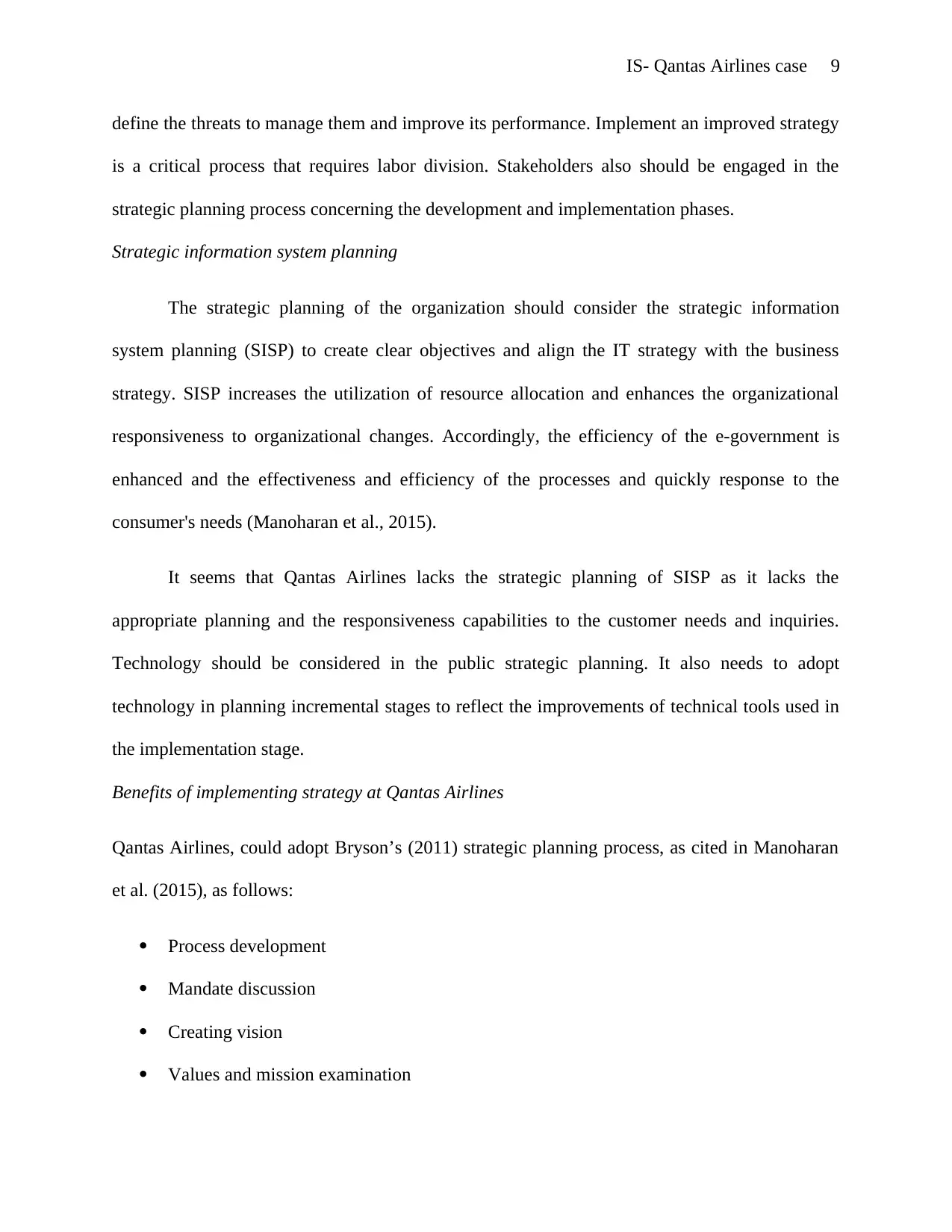
9IS- Qantas Airlines case
define the threats to manage them and improve its performance. Implement an improved strategy
is a critical process that requires labor division. Stakeholders also should be engaged in the
strategic planning process concerning the development and implementation phases.
Strategic information system planning
The strategic planning of the organization should consider the strategic information
system planning (SISP) to create clear objectives and align the IT strategy with the business
strategy. SISP increases the utilization of resource allocation and enhances the organizational
responsiveness to organizational changes. Accordingly, the efficiency of the e-government is
enhanced and the effectiveness and efficiency of the processes and quickly response to the
consumer's needs (Manoharan et al., 2015).
It seems that Qantas Airlines lacks the strategic planning of SISP as it lacks the
appropriate planning and the responsiveness capabilities to the customer needs and inquiries.
Technology should be considered in the public strategic planning. It also needs to adopt
technology in planning incremental stages to reflect the improvements of technical tools used in
the implementation stage.
Benefits of implementing strategy at Qantas Airlines
Qantas Airlines, could adopt Bryson’s (2011) strategic planning process, as cited in Manoharan
et al. (2015), as follows:
Process development
Mandate discussion
Creating vision
Values and mission examination
define the threats to manage them and improve its performance. Implement an improved strategy
is a critical process that requires labor division. Stakeholders also should be engaged in the
strategic planning process concerning the development and implementation phases.
Strategic information system planning
The strategic planning of the organization should consider the strategic information
system planning (SISP) to create clear objectives and align the IT strategy with the business
strategy. SISP increases the utilization of resource allocation and enhances the organizational
responsiveness to organizational changes. Accordingly, the efficiency of the e-government is
enhanced and the effectiveness and efficiency of the processes and quickly response to the
consumer's needs (Manoharan et al., 2015).
It seems that Qantas Airlines lacks the strategic planning of SISP as it lacks the
appropriate planning and the responsiveness capabilities to the customer needs and inquiries.
Technology should be considered in the public strategic planning. It also needs to adopt
technology in planning incremental stages to reflect the improvements of technical tools used in
the implementation stage.
Benefits of implementing strategy at Qantas Airlines
Qantas Airlines, could adopt Bryson’s (2011) strategic planning process, as cited in Manoharan
et al. (2015), as follows:
Process development
Mandate discussion
Creating vision
Values and mission examination
⊘ This is a preview!⊘
Do you want full access?
Subscribe today to unlock all pages.

Trusted by 1+ million students worldwide
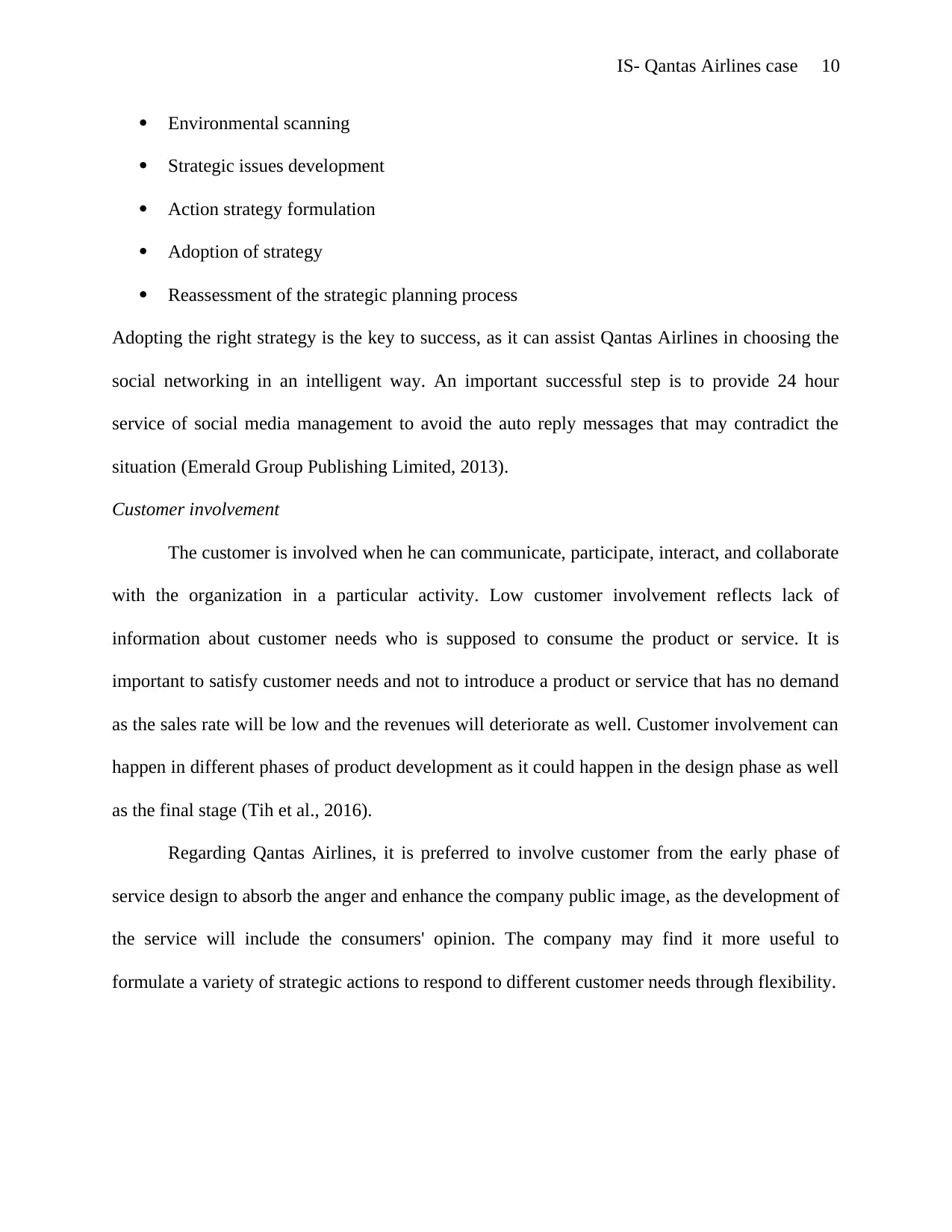
10IS- Qantas Airlines case
Environmental scanning
Strategic issues development
Action strategy formulation
Adoption of strategy
Reassessment of the strategic planning process
Adopting the right strategy is the key to success, as it can assist Qantas Airlines in choosing the
social networking in an intelligent way. An important successful step is to provide 24 hour
service of social media management to avoid the auto reply messages that may contradict the
situation (Emerald Group Publishing Limited, 2013).
Customer involvement
The customer is involved when he can communicate, participate, interact, and collaborate
with the organization in a particular activity. Low customer involvement reflects lack of
information about customer needs who is supposed to consume the product or service. It is
important to satisfy customer needs and not to introduce a product or service that has no demand
as the sales rate will be low and the revenues will deteriorate as well. Customer involvement can
happen in different phases of product development as it could happen in the design phase as well
as the final stage (Tih et al., 2016).
Regarding Qantas Airlines, it is preferred to involve customer from the early phase of
service design to absorb the anger and enhance the company public image, as the development of
the service will include the consumers' opinion. The company may find it more useful to
formulate a variety of strategic actions to respond to different customer needs through flexibility.
Environmental scanning
Strategic issues development
Action strategy formulation
Adoption of strategy
Reassessment of the strategic planning process
Adopting the right strategy is the key to success, as it can assist Qantas Airlines in choosing the
social networking in an intelligent way. An important successful step is to provide 24 hour
service of social media management to avoid the auto reply messages that may contradict the
situation (Emerald Group Publishing Limited, 2013).
Customer involvement
The customer is involved when he can communicate, participate, interact, and collaborate
with the organization in a particular activity. Low customer involvement reflects lack of
information about customer needs who is supposed to consume the product or service. It is
important to satisfy customer needs and not to introduce a product or service that has no demand
as the sales rate will be low and the revenues will deteriorate as well. Customer involvement can
happen in different phases of product development as it could happen in the design phase as well
as the final stage (Tih et al., 2016).
Regarding Qantas Airlines, it is preferred to involve customer from the early phase of
service design to absorb the anger and enhance the company public image, as the development of
the service will include the consumers' opinion. The company may find it more useful to
formulate a variety of strategic actions to respond to different customer needs through flexibility.
Paraphrase This Document
Need a fresh take? Get an instant paraphrase of this document with our AI Paraphraser
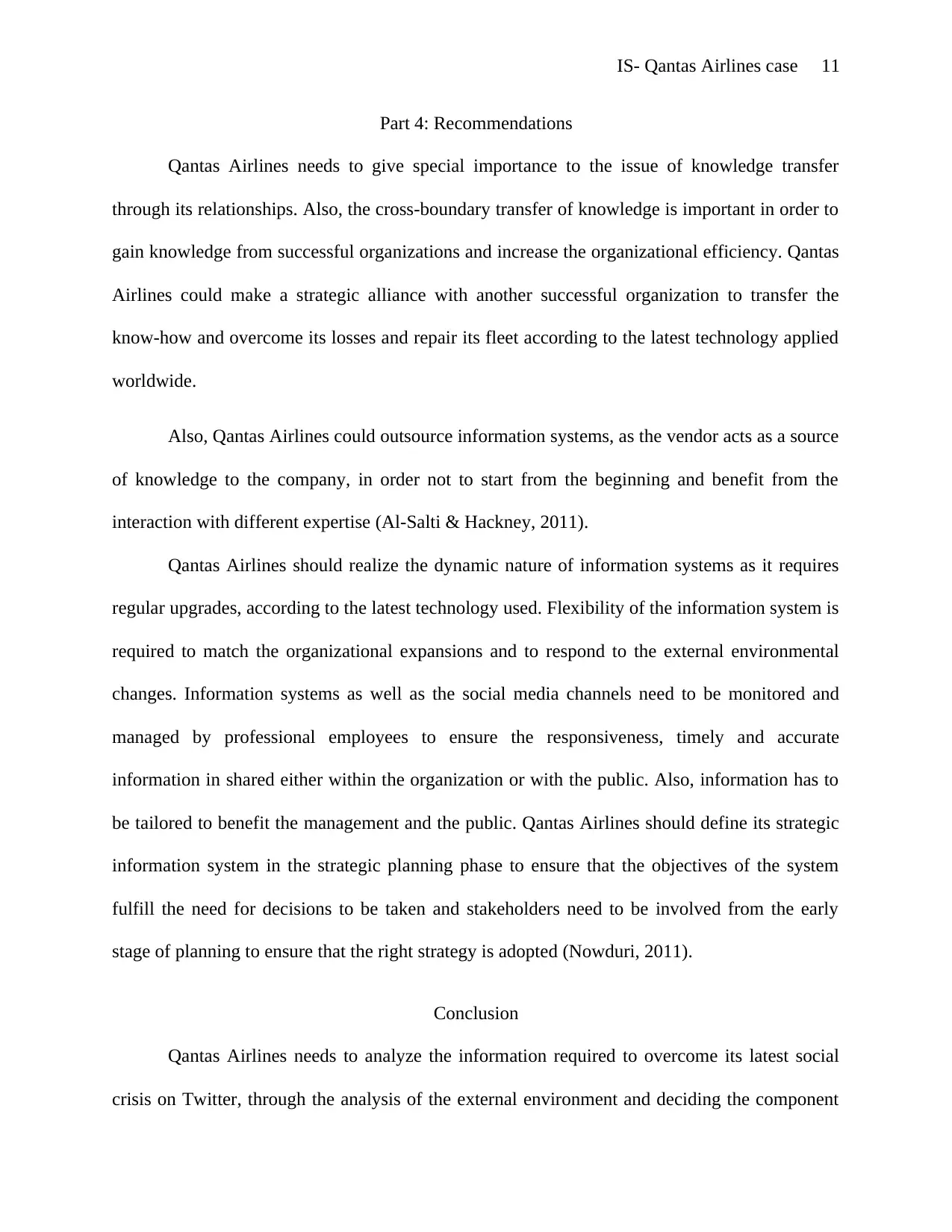
11IS- Qantas Airlines case
Part 4: Recommendations
Qantas Airlines needs to give special importance to the issue of knowledge transfer
through its relationships. Also, the cross-boundary transfer of knowledge is important in order to
gain knowledge from successful organizations and increase the organizational efficiency. Qantas
Airlines could make a strategic alliance with another successful organization to transfer the
know-how and overcome its losses and repair its fleet according to the latest technology applied
worldwide.
Also, Qantas Airlines could outsource information systems, as the vendor acts as a source
of knowledge to the company, in order not to start from the beginning and benefit from the
interaction with different expertise (Al‐Salti & Hackney, 2011).
Qantas Airlines should realize the dynamic nature of information systems as it requires
regular upgrades, according to the latest technology used. Flexibility of the information system is
required to match the organizational expansions and to respond to the external environmental
changes. Information systems as well as the social media channels need to be monitored and
managed by professional employees to ensure the responsiveness, timely and accurate
information in shared either within the organization or with the public. Also, information has to
be tailored to benefit the management and the public. Qantas Airlines should define its strategic
information system in the strategic planning phase to ensure that the objectives of the system
fulfill the need for decisions to be taken and stakeholders need to be involved from the early
stage of planning to ensure that the right strategy is adopted (Nowduri, 2011).
Conclusion
Qantas Airlines needs to analyze the information required to overcome its latest social
crisis on Twitter, through the analysis of the external environment and deciding the component
Part 4: Recommendations
Qantas Airlines needs to give special importance to the issue of knowledge transfer
through its relationships. Also, the cross-boundary transfer of knowledge is important in order to
gain knowledge from successful organizations and increase the organizational efficiency. Qantas
Airlines could make a strategic alliance with another successful organization to transfer the
know-how and overcome its losses and repair its fleet according to the latest technology applied
worldwide.
Also, Qantas Airlines could outsource information systems, as the vendor acts as a source
of knowledge to the company, in order not to start from the beginning and benefit from the
interaction with different expertise (Al‐Salti & Hackney, 2011).
Qantas Airlines should realize the dynamic nature of information systems as it requires
regular upgrades, according to the latest technology used. Flexibility of the information system is
required to match the organizational expansions and to respond to the external environmental
changes. Information systems as well as the social media channels need to be monitored and
managed by professional employees to ensure the responsiveness, timely and accurate
information in shared either within the organization or with the public. Also, information has to
be tailored to benefit the management and the public. Qantas Airlines should define its strategic
information system in the strategic planning phase to ensure that the objectives of the system
fulfill the need for decisions to be taken and stakeholders need to be involved from the early
stage of planning to ensure that the right strategy is adopted (Nowduri, 2011).
Conclusion
Qantas Airlines needs to analyze the information required to overcome its latest social
crisis on Twitter, through the analysis of the external environment and deciding the component
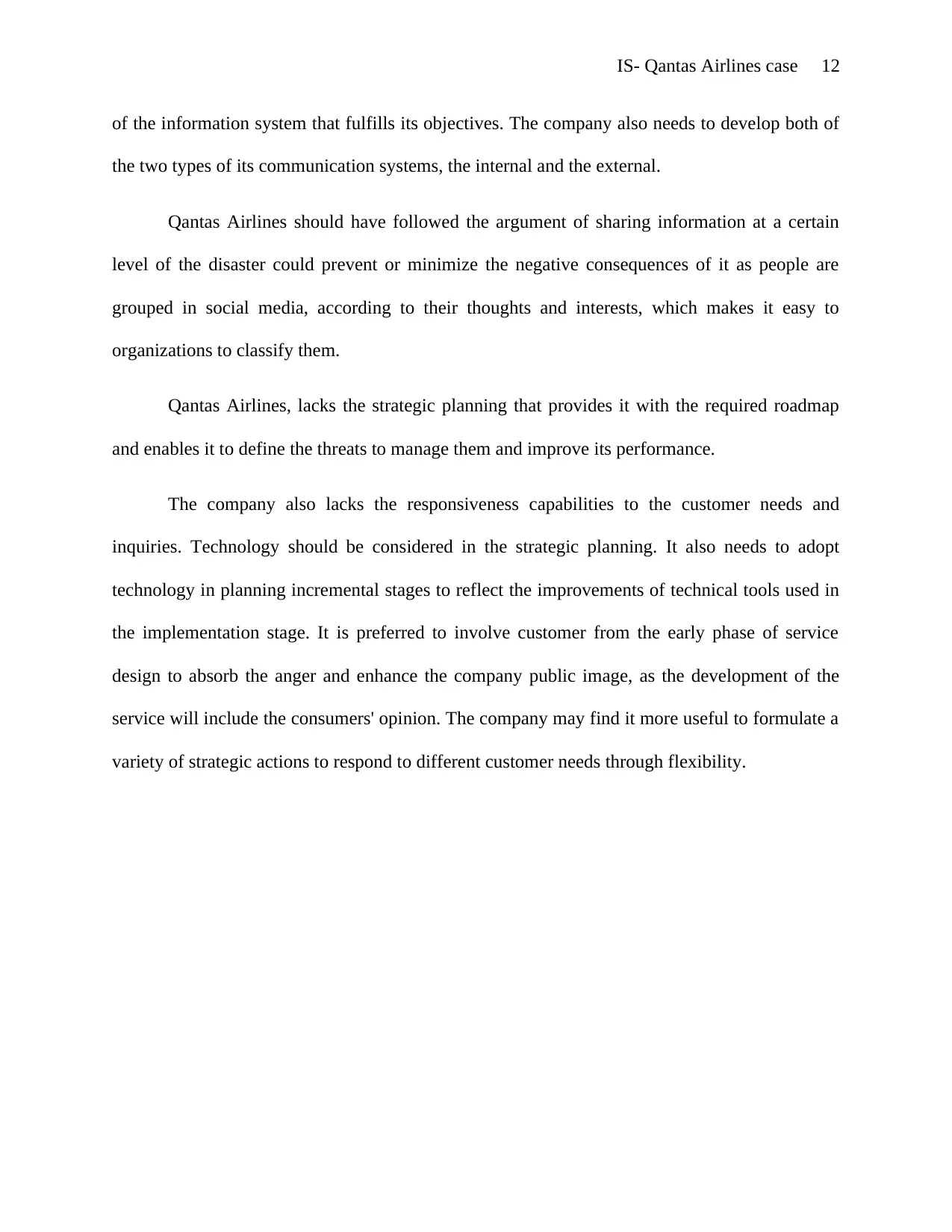
12IS- Qantas Airlines case
of the information system that fulfills its objectives. The company also needs to develop both of
the two types of its communication systems, the internal and the external.
Qantas Airlines should have followed the argument of sharing information at a certain
level of the disaster could prevent or minimize the negative consequences of it as people are
grouped in social media, according to their thoughts and interests, which makes it easy to
organizations to classify them.
Qantas Airlines, lacks the strategic planning that provides it with the required roadmap
and enables it to define the threats to manage them and improve its performance.
The company also lacks the responsiveness capabilities to the customer needs and
inquiries. Technology should be considered in the strategic planning. It also needs to adopt
technology in planning incremental stages to reflect the improvements of technical tools used in
the implementation stage. It is preferred to involve customer from the early phase of service
design to absorb the anger and enhance the company public image, as the development of the
service will include the consumers' opinion. The company may find it more useful to formulate a
variety of strategic actions to respond to different customer needs through flexibility.
of the information system that fulfills its objectives. The company also needs to develop both of
the two types of its communication systems, the internal and the external.
Qantas Airlines should have followed the argument of sharing information at a certain
level of the disaster could prevent or minimize the negative consequences of it as people are
grouped in social media, according to their thoughts and interests, which makes it easy to
organizations to classify them.
Qantas Airlines, lacks the strategic planning that provides it with the required roadmap
and enables it to define the threats to manage them and improve its performance.
The company also lacks the responsiveness capabilities to the customer needs and
inquiries. Technology should be considered in the strategic planning. It also needs to adopt
technology in planning incremental stages to reflect the improvements of technical tools used in
the implementation stage. It is preferred to involve customer from the early phase of service
design to absorb the anger and enhance the company public image, as the development of the
service will include the consumers' opinion. The company may find it more useful to formulate a
variety of strategic actions to respond to different customer needs through flexibility.
⊘ This is a preview!⊘
Do you want full access?
Subscribe today to unlock all pages.

Trusted by 1+ million students worldwide
1 out of 15
Related Documents
Your All-in-One AI-Powered Toolkit for Academic Success.
+13062052269
info@desklib.com
Available 24*7 on WhatsApp / Email
![[object Object]](/_next/static/media/star-bottom.7253800d.svg)
Unlock your academic potential
Copyright © 2020–2026 A2Z Services. All Rights Reserved. Developed and managed by ZUCOL.





